
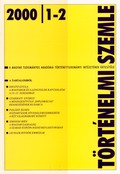
Gyula Kristó: Hungarian-Polish Relations between the Tenth and Twelfth Centuries
György Gyarmati: The Failure of the ’Diplomatic’ Settlement of the Mindszenty Affair
József Hudi: Middle-Class Book Culture in Veszprém in the Eighteenth and Nineteenth Centuries
Ágnes Pogány: Household Incomes in Hungary between the two World Wars
Irén Simándi: The Hungarian Economy in Radio Free Europe’s Reflektor [Reflector] (1951–1956)
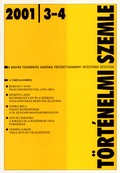
Iván T. Berend: Zsigmond Pál Pach (1919–2001). An Impressive Scholarly Oeuvre
Béla Tomka: Welfare Regimes in Twentieth-Century Hungary: An International Comparison
Miklós Konrád: Jewish Charity and Assimilation at the turn of the Twentieth Century
Gábor Vermes: The World View of István Tisza
István Janek: A Forgotten War: The History of the Slovak–Hungarian “Little War” in March 1939
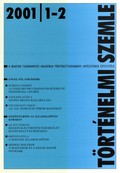
András Kubinyi: A Public Record of the Császárvár Estate Dating from 1489
Attila Zsoldos: The Origins of Szepes County
Enikő Csukovits: Knights Pilgrimages
Zsuzsa Teke: The Financial Condition of Florentine Businessmen Acting in Hungary of Sigismund’s Age
Árpád Nógrády: The Szerdahelyi Family and the Predium-Holders of Rojcsa
György Székely: Czechs and Hungarians in the Tenth and Eleventh Centuries
Gyula Kristó: The Foundation of the Hungarian State
Herwig Wolfram: The Hungarians and the Frankisch-Bavarian Ostmark
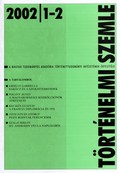
Márta Font: The Kingdom of Hungary and the Kievan Rus at the First Millennium
Erzsébet Ladányi: Self-Government by the King’s Command in Thirteenth-Century Hungary
Gabriella Erdélyi: Tamás Bakócz and the Religious Orders. A Case Study
Ágnes Pogány: The History of Hungarian Public Loans from World War I until the Financial Stabilization
Gusztáv Kecskés: French Diplomacy and the Hungarian Revolution of 1956
István György Tóth: A Document from Sarajevo on the Bosnian Franciscans in Pest (1664)
Gábor Schweitzer: Rabbi at the Teacher’s Desk: Sándor Büchler and His Qualification as a Lecturer in 1914
Paul Gradwohl: French Military Policy and Hungary in the Early 1920s: The Illustration of an Illusion
Miklós Szalai: Political Diary of Count Gyula Andrássy Jr. (Details, 1907–1913)
Péter E. Kovács: Archduke Ferdinand and Hungary (1521–1526)
Géza Pálffy: The Hungarian Nobility at the Viennese Court of Ferdinand I
István Kenyeres: The Financial Administrative Reforms and Revenues of Ferdinand I in Hungary
József Bessenyei: King Ferdinand and the Hungarian Aristocracy 1526–1540
Teréz Oborni: Plans of the Viennese Court to Retake Possession of Transylvania, 1557–1563
István György Tóth: The Contradictions of Catholic Renewal Under Ferdinand I
István Fazekas: Miklós Oláh’s Attempts at Reform in the Esztergom Diocese Between 1553 and 1568
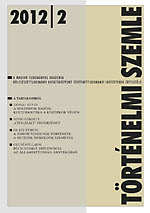 STUDIES
STUDIES
István Tringli: The Ship of Fools. Cultural Criticism at the End of the Middle Ages 175
Klára Hegyi: Reflections of the Efforts at Consolidation by Pashas Sokollu Mustafa and Kara Üveys of Buda 187
Gergely Tóth: “Civilised” Prehistory. Research of the Origins of the Hungarian Language and Nation in the Oeuvre of Mátyás Bél 219
Ferenc Glatz: The History of the Három nemzedék from the Perspective of the Seventh Generation 247
Tamás Stark: The Victims of Russian Forced Labour (“malenkij robot”) from Budapest 1944–1945. The Lessons of the Analysis of a Group of Sources 279
Lajos Gecsényi: Fiasco at Vienna. Diplomacy in the Shadow of State Security: the “Teleki–Kertész Affair” – 1958 315
WORKSHOP
Tibor Neumann: “One-plot Nobleman”. On the Interpretation of a Medieval Concept 337
REVIEW ARTICLE
Antal Molnár: The History of Croatia through Hungarian Eyes. Thoughts on the New Book of Dénes Sokcsevits 347
Page 11 of 14